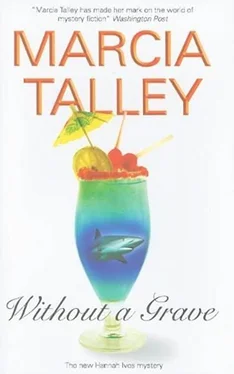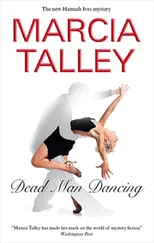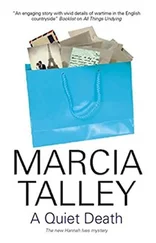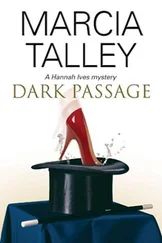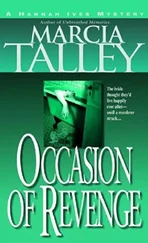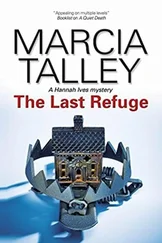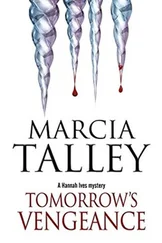A small, eco-friendly marina for twenty boats up to 200 feet in length . I smiled grimly. Everything about that phrase was an oxymoron.
I surfaced for a moment, clutching the tatty remains of an old fishing net to keep the tide from carrying me sideways. I heard the growl of an engine starting up – a chainsaw? – then continued working my way along the pier, looking for something, anything even remotely suspicious.
The pipe I had been following appeared not to have been used in some time; parts of it lay in pieces, like elbow macaroni. Sea grass flourished on the sand bottom. Nearer shore, I noticed rectangular patterns in the grass, each roughly the size of a carry-on suitcase. Something had lain there long enough to smother the sea grass, and recently, too.
I surfaced under the dock, breathing fast. Is that what Frank had seen? What he’d died for? I held on to a piling, thinking furiously. The first thing that came to mind was drugs, but I’d never seen a package of drugs that hadn’t come from a pharmacy. Were they small as a brick? Large as a footlocker? And could they be waterproofed?
I had taken a breath to go down for a second look when I felt it. Vibrations. Somebody was heavy-footing it along the pier.
Hugging the piling, I eased around under the pier just as his shadow passed overhead. Through gaps in the planking I could see the zigzag tread of a boat shoe, a bit of bare ankle. I hoped he couldn’t see me.
My visitor began whistling tunelessly. ‘Here you go,’ he said. There was a whoosh followed by a red-tinged splash as a bucketful of mahi-mahi heads, backbones and tails hit the water not eight feet away from where I hung, still clinging to the rotting net.
Gross. I had picked a bad time to explore. I loved eating fish, but getting so up close and personal to their remains made me want to barf. One particularly large fish head stared at me reproachfully, as if chastising me for all the seafood meals I’d enjoyed both now and in the future, as it floated on the surface for a moment, then spiraled slowly to the bottom.
Drawn by some underwater radar, schools of yellow jacks and smallmouth grunts flashed in out of nowhere to chow down. A nurse shark, brownish-grey and about eight feet long, moseyed over from where he’d been dozing in the mangrove, joined by another one, slightly smaller. Then a third joined the banquet. Instinctively, I moved away. Nurse sharks are relatively harmless – they prefer to suck down their prey rather than bite it – but the mouths on these fellows looked as big as aircraft carriers from where I was hanging, and I wasn’t sure how keen their eyesight was.
The whistling stopped.
Something was wrong. The nurse sharks sensed it, too. Ignoring the free lunch, the trio shied away. Had they spotted me?
It’s a common misconception that shark attacks are preceded by ‘dah-da, dah-da, dah-da, dah-da,’ grating strings and blaring horns, accelerating rapidly as the shark gets closer.
Not true. It’s silent, eerily so.
A fish I recognized immediately sleeked into view – a reef shark, his skin flashing silver in the sun. There are several varieties of reef shark – white tip, black tip, gray and silver – but when they’re swimming in your direction at five hundred miles per hour, you don’t stop to check your Fish Watcher’s Field Guide to find out which kind. As I hung there, frozen in fear, he circled the pier, coming so close to me at one point that I could have touched his fin.
I had no intention of sticking around and becoming the main course among the sea of floating hors d’oeuvres, but I didn’t want to call attention to myself.
What had I read in the survivor’s guide?
One. Remain calm. (Easier said than done.)
Two. Don’t splash around like an injured or dying fish. (Noted.)
Three. If a shark approaches, strike it repeatedly with a balled-up fist on its most sensitive parts, the eyes and the gills. Uh, right. The eye in question was passing me again, black as wet coal, round as a silver dollar.
I’d seen sharks in aquariums, but they never looked so big. The shark made another circuit, looming bigger, ever bigger. Blood pounded in my ears. I balled up my fist, holding it close to my chest, getting ready.
The shark shot by, so close I felt the backwash. Its tail touched my leg, scraping along my thigh like sandpaper. His jaw yawned open, his black eye closed, and two yellow jacks that had been wrangling over a mahi-mahi head disappeared in a single snap. Last time they’d scrap over a meal.
While the shark was busy swallowing the jacks, I took the fourth piece of advice from the handbook – I turned and slowly swam away.
I didn’t look back until I reached Pro Bono , hoisted myself up on the rope ladder and threw myself in.
When I dared to look back at the pier, the water was churning as the shark finished off what was left of his feast.
The man still stood at the end of the dock. It was Jaime Mueller.
And I could hear him laughing.
LOBSTERS USUALLY MOVE AROUND AND HUNT FOR FOOD AT NIGHT. IT WAS ONCE THOUGHT THAT LOBSTERS WERE SCAVENGERS AND ATE PRIMARILY DEAD THINGS. HOWEVER, RESEARCHERS HAVE DISCOVERED THAT LOBSTERS CATCH MAINLY FRESH FOOD (EXCEPT FOR BAIT), WHICH INCLUDES FISH, CRABS, CLAMS, MUSSELS, SEA URCHINS, AND SOMETIMES EVEN OTHER LOBSTERS! Lobster FAQ , NOAA’s National Marine FisheriesService, Northeast Fisheries Science Center
It wasn’t until I got back to Windswept and had sprawled on the bench at the end of our dock that I was able to think, let alone catch my breath.
Did Jaime know I was under the pier? Did he chum the water on purpose, or was it simply a case of my being in the wrong place at the wrong time? I didn’t have an answer.
When I thought I would be able to talk about what had just happened, I slogged up the dock to the house.
Paul stood at the kitchen counter holding a fork like a weapon, stabbing the life out of some meat. As I dragged myself into the room he looked up. ‘Thought we’d barbecue some steaks tonight.’
I frowned. When Paul volunteered for cooking duty, it was usually because he wanted something.
‘Hey, Hannah, what’s wrong?’
I plopped down in a kitchen chair. ‘I could really use some iced tea.’
While Paul assembled a glass, ice, tea and some lemon slices, I decided that nothing was wrong. The last thing that I needed just then was a lecture.
‘How was your expedition?’ he asked, handing me the glass. ‘Successful?’
‘Yes,’ I lied, hoping that he wouldn’t ask to inspect my haul of sand dollars.
‘Good.’ He turned his attention back to the meat, drowning it in salad oil, red wine and vinegar. ‘I hope you’re in a good mood because I need to talk to you about something.’
‘Yes?’
He unscrewed the cap from a jar of lemon pepper and started sprinkling it over the steaks. ‘It all started with Euclid.’
I closed my eyes, pressed the cool side of the glass to my temple. ‘Doesn’t it always?’
‘He wrote “Elements of Geometry” way back in 300 BC. It was so good that no other texts from that period even survive. Euclid wiped out the competition.’
I opened one eye. ‘To quote someone I know, don’t build me a clock, Paul. Just tell me what time it is.’
‘I need to go to Baltimore.’
I sat up straight in my chair, slopping iced tea down the front of my shirt. ‘You what ?’
Paul grabbed the back of the chair opposite me, pushed it so close that our knees touched when he sat down on it, and took my hand. ‘Just for a few days. I need to consult a copy of the first English translation of Euclid’s Elements , the one Sir Henry Billingsley wrote in 1570.’
Читать дальше
